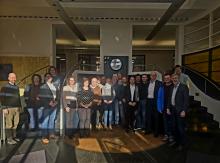Today (17 January), the official go-ahead was given in Döbeln for the feasibility study on the development of a sustainable biogas supply. Aim of the study is to investigate the supply of a climate-neutral energy source to the city of Döbeln's combined heat and power plants and the long-term supply of biomethane. This pioneering project is being carried out jointly by Stadtwerke Döbeln, TU Bergakademie Freiberg (TUBAF), AEV-Energy GmbH and DBI Gas- und Umwelttechnik GmbH. Bioenergiezentrum Westewitz GmbH is involved in the study as one of the first biogas plant operators. The feasibility study will examine the development of an expandable biogas network with a centralised processing plant.
The biogas network serves to connect biogas plants in the Döbeln region that want to provide the biogas they produce to supply energy to the city of Döbeln. The project will record and localise the potential, identify feed-in points and roughly map out the network. On the initiative of the district administration's Department of Economic Promotion and District Development, other agricultural businesses have been invited to participate.
"This project could only be launched thanks to strong cooperation between the various regional players and is intended to make sustainable use of regional resources," says Dr Lothar Beier, 1st Deputy Mayor of the district of Central Saxony.
The feasibility study focuses on the development of a biogas network that will supply the combined heat and power plants and gas customers in Döbeln with climate-neutral biogas and biomethane in the long term. To this end, a detailed analysis of the potential of biogas plants in the area surrounding the town is being carried out. The study includes recording the city's biogas potential and demand, identifying economically viable feed-in points and the rough layout of an expandable biogas network. In addition, a timetable for the gradual expansion of the network will be drawn up, taking into account both the technical equipment requirements and the economic viability of the project.
The feasibility study is being carried out in close collaboration between Stadtwerke Döbeln and TU Bergakademie Freiberg, AEV-Energy GmbH and DBI Gas- und Umwelttechnik GmbH. "With the study, we want to create a sound basis for decision-making for the implementation of a biogas project that will serve as a model for a sustainable and climate-neutral energy supply in Döbeln and beyond," says Gunnar Fehnle, Managing Director of Stadtwerke Döbeln and head of the project.
A central component of the study is the close cooperation with regional biogas plant operators, such as Bioenergiezentrum Westewitz GmbH, which is one of the first partners to be actively involved. Other biogas operators from the region are also involved in the analysis and planning, so that the regional conditions and existing biogas potential are optimally taken into account. With this feasibility study, Stadtwerke Döbeln is pursuing the goal of establishing a long-term, sustainable and climate-neutral energy supply based on biogas. The project should not only benefit Stadtwerke Döbeln and the partners involved, but also serve as a blueprint for comparable initiatives in other regions.
"The results of this feasibility study are expected to be available in June 2025," says Prof Dr Hartmut Krause, holder of the Chair of Gas and Heating Technology at TU Bergakademie Freiberg, looking to the future. Stadtwerke Döbeln and all partners involved are confident that this pioneering project will create a solid foundation for a sustainable, climate-neutral and economical energy supply for end customers and producers - a development that is also supported by the district of Central Saxony. TUBAF is coordinating the joint project.
